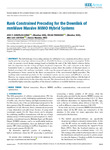Rank Constrained Precoding for the Downlink of mmWave Massive MIMO Hybrid Systems

View/
Use this link to cite
http://hdl.handle.net/2183/27749
Except where otherwise noted, this item's license is described as Atribución 4.0 Internacional (CC BY 4.0)
Collections
- Investigación (FIC) [1678]
Metadata
Show full item recordTitle
Rank Constrained Precoding for the Downlink of mmWave Massive MIMO Hybrid SystemsDate
2021-02-11Citation
J. P. González-Coma, Ó. Fresnedo and L. Castedo, "Rank Constrained Precoding for the Downlink of mmWave Massive MIMO Hybrid Systems," in IEEE Access, vol. 9, pp. 28459-28470, 2021, doi: 10.1109/ACCESS.2021.3058844.
Abstract
[Abstract]
The hybrid design of precoding schemes for millimeter-wave communications allows exploiting the gains by using large antenna array with an affordable hardware cost and power consumption. In this work, we present a novel design strategy based on limiting the rank of the fully digital solutions before their decomposition into the analog and digital baseband components. This rank constraint on the digital formulation leads to a joint precoding and scheduling scheme where the number of allocated streams is limited according to the hardware constraints. In this way, the proposed approach can significantly reduce the performance losses caused by the direct decomposition of the unconstrained digital precoders. The resulting rank-constrained problems for the considered scenario are not convex and difficult to sort out. However, we propose several algorithms to compute the rank-constrained digital solutions with the help of the uplink-downlink duality for the achievable sum-rate. The obtained results show that this strategy achieves considerably higher sum-rates regardless of the channel conditions or available hardware resources.
Keywords
Radio frequency
Precoding
Hardware
Baseband
Downlink
Massive MIMO
Antenna arrays
Precoding
Hardware
Baseband
Downlink
Massive MIMO
Antenna arrays
Editor version
Rights
Atribución 4.0 Internacional (CC BY 4.0)
ISSN
2169-3536






